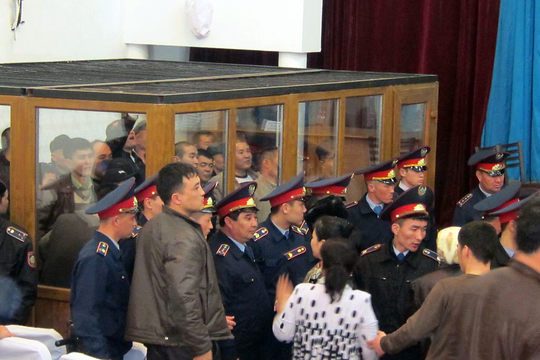
Zhanaozen Trials: Former Oil Executive Receives the Longest Prison Punishment
Publication: Eurasia Daily Monitor Volume: 9 Issue: 107
By:

The courts in Mangistau region of Kazakhstan concluded the trials of 56 people held accountable for the violent events in Zhanaozen and Shetpe on December 16-17, 2011. These rulings sent a strong message that all sides that contributed to the escalation of the oil workers’ labor dispute into violent riots and subsequent police shooting are equally responsible. Since March, several parallel trials have been held against protestors, police officers, oil company managers and local government officials.
The longest prison term – eight years – was received by an oil company executive, followed by seven-year prison sentences handed down to two other oil company managers, one police officer and two civilians convicted for organizing the riots. The court also ordered that the property of six convicted police officers and three oil company executives be confiscated. Proceedings against local officials have not been completed yet, but prosecutors have requested 13 years imprisonment for the former mayor of Zhanaozen for embezzling public funds. The trials of opposition leaders, charged with inciting rioting are expected to start in June. Among the accused are the Alga party leader Vladimir Kozlov, politician Serik Sapargali, theater director Bolat Atabaev, and journalist Zhanbolat Mamay (Tengrinews.kz, May 21, June 4; Radio Azattyq, May 26, June 1; Lada.kz, June 5).
On June 4, the largest trial of 37 Zhanaozen residents charged with organizing and participating in the riots on December 16, 2011, ended with disorder in the courtroom in Aktau, the administrative center of Mangistau region in western Kazakhstan. Judge Aralbay Nagashybayev was unable to finish reading out the sentences as indignant relatives and friends of the defendants began shouting and throwing objects at him. Meanwhile, the defendants attempted to break the glass barriers that separated them from the audience, triggering an intervention by the security guards (Interfax-Kazakhstan; Lada.kz, June 4).
Most of the defendants at this trial, however, will not serve jail time. Three were acquitted, five amnestied, 16 were given suspended sentences, and 13 were imprisoned from three to seven years. The court made a clear distinction between those who organized the riots and those involved in theft, arson, and looting. Among the organizers who will serve prison time are seven leaders of the oil workers’ strike that started in May 2011 and evolved into violent riots on December 16. Roza Tuletaeva, charged as the main organizer of the riots, was the only one that received a seven-year prison term, to be served out in a low security facility. Tuletaeva was the main spokesperson for the striking oil workers and provided information to the media and international organizations (frontlinedefenders.org, May 18). Tuletaeva and other defendants claimed during the trial to have been tortured in detention. Influential strike leader Maksat Dosmagambetov was convicted to a term of six years, another trade union activist, Talgat Saktaganov, will serve four years in a low security prison. Naryn Dzharilgasinov and Kanat Zhusipbaev will serve a six-year term each, Shabdal Utkilov was sentenced to five years of imprisonment, and seven other people received jail sentences of three to four years (Interfax-Kazakhstan, June 4; Lada.kz, June 5).
In a separate court case, 12 protesters were tried for rioting in the village of Shetpe when a train was set on fire and one person died from shotgun wounds in the unfolding police shooting. The court acquitted one defendant, suspended the sentence of another, and amnestied six more, but four protesters were judged liable and sentenced to terms ranging from four to seven years. Kazhymurat Avezov received the harshest sentence of seven years in a high security prison (Tengrinews.kz, May 21). The court also imposed fines upon the 11 persons found guilty, in the amount of 16,296,000 tenge (about $108,000), to cover the property damage they caused (Tengrinews.kz, May 21).
On May 28, five former senior police officers were jailed for between five and seven years in addition to the confiscation of their personal property and a five-year ban on holding any law enforcement position after their release. Kabdigali Utegaliyev, former deputy chief for Mangistau, was convicted to seven years in prison. The former head of the regional anti-extremist department, Bekzhan Bagdabaliyev; the former deputy chief for Zhanaozen, Yerlan Bakytkaliuly; and the former regional police investigator, Rinat Zholdybayev, have been jailed for six years, and Nurlan Yesbergenov, the former investigator at the Zhanaozen town police, for five years. The police officers were convicted of “abuse of power or official authority, resulting in serious consequences, with the use of weapons.” Prosecutors stated in court that the police response to the rioters was disproportionate in some cases; they could have used other methods such as rubber bullets and batons instead of firearms (Interfax-Kazakhstan, Tenginews.kz, May 28).
On May 17, the former head of a Zhanaozen pre-trial detention facility, Zhenisbek Temirov, was sentenced to five years in jail and seizure of property for holding people illegally and failing to provide timely hospitalization to Bazarbai Kenzhebayev, who later died in the hospital. He will have to pay compensation to the family of the deceased (Interfax-Kazakhstan, May 17).
On May 24, the city court of Zhanaozen sentenced the former Razvedka Dobycha KazMunayGas managing director for safety, health and environmental protection, Serik Baymuhanbetov, to eight years in prison and confiscation of property for using his office position to embezzle public funds. On similar charges, the former general director of LLP Munay Ekologiya Company, Duman Aripbaev, and the former top manager of this company, Unerbek Alshimbaev, were each sentenced to seven years in prison and confiscation of property. The Prosecutor General Askhat Daulbaev stated during the investigation that, by embezzling funds designated for development programs, local officials and oil company executives contributed to rising social tensions and prolonging the strike that eventually culminated in mass rioting (Interfax-Kazakhstan, Radio Azattyq, May 26).
At present, two former mayors of Zhanaozen and the former deputy governor of Mangistau region are on trial for corruption and embezzlement. Additional charges may be brought against other local officials and oil company managers.




